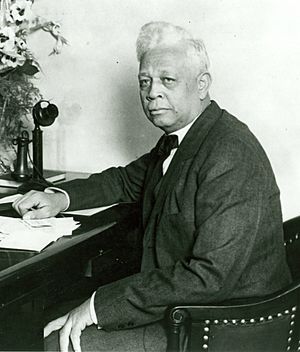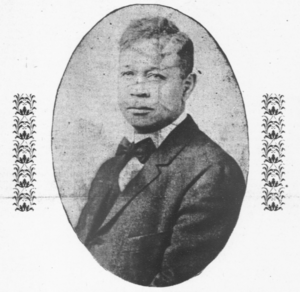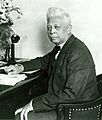Oscar Stanton De Priest facts for kids
Quick facts for kids
Oscar Stanton De Priest
|
|
|---|---|
 |
|
| Member of the U.S. House of Representatives from Illinois's 1st district |
|
| In office March 4, 1929 – January 3, 1935 |
|
| Preceded by | Martin B. Madden |
| Succeeded by | Arthur W. Mitchell |
| Member of the Chicago City Council | |
| In office 1943–1947 |
|
| Preceded by | Benjaim A. Grant |
| Succeeded by | Archibald Carey Jr. |
| Constituency | 3rd Ward |
| In office 1915–1917 |
|
| Succeeded by | Louis B. Anderson |
| Constituency | 2nd Ward |
| Member of the Cook County Board of Commissioners | |
| In office 1904–1908 |
|
| Preceded by | Archibald Carey Jr. |
| Personal details | |
| Born | March 9, 1871 Florence, Alabama, U.S. |
| Died | May 12, 1951 (aged 80) Chicago, Illinois, U.S. |
| Resting place | Graceland Cemetery |
| Political party | Republican |
| Spouse |
Jessie De Priest
(m. 1898) |
| Children | 2 |
Oscar Stanton De Priest (born March 9, 1871 – died May 12, 1951) was an important American politician. He was also a strong supporter of civil rights for all people. De Priest was from Chicago, Illinois.
He made history as the first African American person elected to the U.S. Congress in the 20th century. He served three terms from 1929 to 1935. During this time, he was the only African American in Congress. He was also the first African American U.S. Representative from a state outside the South.
Oscar De Priest was born in Alabama to parents who had been freed from slavery. He grew up in Ohio. Later, he moved to Chicago and became very successful in business. He worked as a contractor and in real estate. In 1914, he became the first African American elected to the Chicago City Council.
In Congress, De Priest worked hard to fight against unfair treatment based on race. He tried to make public places in the House of Representatives open to everyone. He also helped pass a rule to stop segregation in a big government work program called the Civilian Conservation Corps. He even tried to pass a law against lynching, which was a terrible act of violence. After his time in Congress, he continued his businesses and returned to politics in Chicago.
Contents
Early Life and Moving North
Oscar De Priest was born in 1871 in Florence, Alabama. His parents, Martha and Neander, were freedmen, meaning they were formerly enslaved people. His father worked with horses and wagons.
After the American Civil War, many African Americans faced unfair treatment in the South. In 1878, Oscar's family moved from Alabama to Dayton, Ohio. This was a time when many Black families left the South looking for more freedom and better chances.
Building a Business Career
De Priest went to school in Salina, Kansas, to learn bookkeeping. This is a skill for managing money and records. In 1889, he moved to Chicago, a fast-growing city.
He started by learning trades like plastering and painting. Soon, he became a successful contractor and real estate agent. He made a lot of money by helping Black families buy homes in neighborhoods that were once only for white people.
Early Steps in Politics
Oscar De Priest began his political journey in 1904. He served on the board of commissioners for Cook County, Illinois, until 1908.
In 1914, he was elected to the Chicago City Council. He served as an alderman, which is like a city council member, from 1915 to 1917. He was the first Black alderman in Chicago's history.
In 1917, he was accused of wrongdoing and left the City Council. However, he hired a famous lawyer, Clarence Darrow, and was found not guilty. After this, he worked to rebuild his political career. He started his own political group, which became very strong in Chicago.
Serving in Congress
In 1928, a Republican congressman named Martin B. Madden passed away. The mayor of Chicago chose Oscar De Priest to take his place on the ballot. De Priest won the election. He became the first African American elected to Congress from outside the South. He was also the first to be elected in the 20th century.
He represented the 1st Congressional District of Illinois. This district included parts of Chicago. De Priest served three terms in Congress, from 1929 to 1935. During this time, he was the only Black representative in Congress.
Fighting for Equal Rights
During his time in Congress, De Priest worked hard to stop unfair treatment. He introduced several bills to fight discrimination.
One important achievement was his 1933 amendment for the Civilian Conservation Corps (CCC). The CCC was a program under President Franklin D. Roosevelt's New Deal that gave jobs to many people. De Priest's amendment made sure that the CCC could not treat people differently based on their race. This rule was passed and became law.
He also introduced a bill to make lynching illegal. This bill did not pass because many white Democrats from the South opposed it. However, De Priest spoke strongly about the issue.
De Priest also fought for equal access in public places. He spoke out against segregation in the House of Representatives' public restaurant. He believed that all visitors, including Black students from Howard University, should be able to eat there. He argued that denying them access was against their rights. Even though there was a big debate, the restaurant remained segregated for many years.
Political Views and Challenges
De Priest generally did not support many of the new federal programs of the New Deal. He thought that states or local governments should handle more of these issues. He was also very against communism.
In 1929, De Priest's wife, Jessie De Priest, made national news. First Lady Lou Hoover invited her to a special tea at the White House. This was a big event because it was rare for an African American woman to be invited to such an event at the White House.
De Priest also helped Benjamin O. Davis Jr. get into the United States Military Academy at West Point. At that time, Davis's father was the only African American officer in the Army.
By the early 1930s, De Priest's popularity started to decrease. This was partly because he did not support some of President Roosevelt's programs to help people during the Great Depression. In 1934, he lost his re-election to Arthur W. Mitchell. Mitchell was another African American politician, but he was a Democrat who supported the New Deal.
After leaving Congress, De Priest returned to his successful businesses in Chicago. He also returned to politics. In 1943, he was elected to the Chicago City Council again, serving until 1947. He passed away in Chicago at the age of 80 and is buried in Graceland Cemetery.
Family Life
Oscar De Priest was married to Jessie L. Williams. They had two sons together. Their son Laurence passed away at age 16. Their other son was Oscar Stanton De Priest, Jr.
Today, De Priest's great-grandson, Philip R. DePriest, is working to preserve his family's history. He is restoring Oscar De Priest's old political office and home.
Legacy and Honors
- The Oscar Stanton De Priest House in Chicago is a very important historical site. It has been named a National Historic Landmark.
Images for kids
See also
 | Selma Burke |
 | Pauline Powell Burns |
 | Frederick J. Brown |
 | Robert Blackburn |




